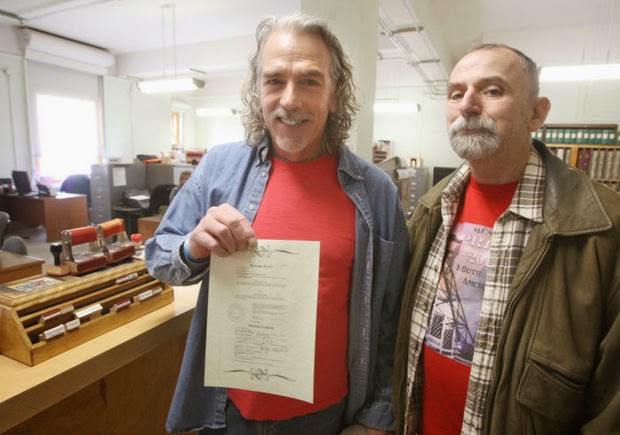There is no chief, sole reason for homosexuals. “God made them, as part of his universe” is still the best and blindest answer to “why”. Don’t call on an M.D.; knock at Heaven’s Gate for enlightenment. . . .
Why is there homosexuality? Because there is pleasure in it. Because it is natural. Because it always was and always will be, as part of the universe. Because God so wills.
--Allen Bernstein, 1940
The other day, while poking around the intertubes looking for something else, your Head Trucker stumbled by chance upon a remarkable document of gay history:
Millions of Queers (Our Homo America), written in 1940 by Allen Bernstein, a 27-year-old Jewish gay guy from New England. Although it's a long read at 140-plus pages, I heartily recommend it to all my truckbuddies as a vivid time capsule from our gay past.
And yes, Bernstein uses the word
gay, as well as
gayness, exactly as we do today - proof positive that the word was indeed current among our kind in the 1930's, and probably well before that.
Why have you never heard of this work before now? Because although Bernstein wrote several essays and some poems on gay subjects, none of them were published in his lifetime. But after he was arrested and booted out of the Army in 1944 with a Section 8 (psychiatric) discharge, as was required by law at the time for anyone discovered to be a homosexual, he immediately wrote to Army authorities appealing the decision. They turned him down, of course, but he kept on appealing for the next 37 years, until finally the Army relented in 1981 and granted him a retroactive honorable discharge.
Along with his first appeal in 1944, Bernstein sent a copy of his
magnum opus, which was of course ignored - and somehow ended up in the archives of the National Library of Medicine in Washington, D. C., where it was discovered in 2010 by Richard Sell, a professor at the Drexel University School of Public Health. The typescript was published on OutHistory.org last March, along with a biography by Professor Sell and an analysis by gay historian Jonathan Ned Katz.
Bernstein's life story is very interesting in and of itself: born in New Hampshire and growing up in Salem, Massachusetts, after graduating from high school he went on to college and after that to the University of Chicago, where he earned a master's degree in history in 1934. Somewhere along the way, he became familiar with
the nocturnal admirers of the juggling Jackson statue in front of the White House, the inhabitants of Boston's Public Gardens or Common, or of New York's or Chicago’s numerous parks, or the patrons of selected beer joints or restaurants in any large city, or the seatchangers in the grope theaters in every metropolitan area (viz. 42nd St.), many residents in Y.M.C.A. furnished rooms, . . .
and became what society would have called a practicing homosexual. In the introduction to his essay, he credits "a few close friends and many chance acquaintances whose phrases, experiences, or lives are included here."
But while he does limn the outlines of gay life in 1930's America, Bernstein also goes far beyond that. His wide research and reading in historical, literary, and legal sources shine from nearly every page of the typescript in quotations and references where he gives a broad outline of homosexuality in the Western world from ancient times to modern. As far as I know, such an extensive survey of gay life through the centuries was not attempted again until Katz published his landmark
Gay American History in 1976, a work I have had on my bookshelves for many years, and I'm sure many of my truckbuddies have too.
Indeed, Katz himself in a review of
Millions of Queers remarks:
Reading Bernstein’s rendering of homosexual American history in “Millions” I was personally and deeply moved to realize that he had found and consulted the same old, dusty bibliographies and quoted many of the same old documents that I had to rediscover three and four decades later . . . .
Bernstein's apologia has its flaws, though - as the much-marked typescript shows, it has the feel of a work-in-progress, a little rough around the edges and uneven in tone: sometimes erudite, sometimes slangy, and permeated with views long outdated now in light of our greater understanding of biology and psychology, and the progress we have made legally and socially. Katz observes:
Bernstein accepted many of the negative clichés about homosexuals, but argued that they should not be persecuted under the law. . . .
By calling “Millions” a homosexual defense I don’t mean that it’s a radical gay liberation manifesto of 1969, a liberal gay rights tract of the 1990s, or a 2014 critique of sexual neo-liberalism. Bernstein offers a libertarian argument that homosexuals don’t hurt anyone, should not be criminalized and stigmatized, and should be left alone to work out their difficult, non-conforming lives by themselves. Bernstein argues that the state (lawmakers, police, judges, and jailors), the medical establishment (doctors, psychiatrists, psychologists), the media, parents, and citizens, should stop harassing homosexuals.
Bernstein’s defense will disappoint anyone judging it against today’s dominant defense of homosexuals as “normal” exemplars of “mental health.” He takes seriously many of the damning judgments that cursed homosexuals in the U.S., in 1940. Bernstein’s essay documents an archive of bad feelings, the trauma of persons and a group despised and discounted, that he and other homosexuals suffered and had to transcend to survive
Thank goodness we got beyond all that; but this work, written long before "gay liberation" and all that followed from Stonewall, gives the reader a "You Are There" feeling - yes, you have all your modern ideas and attitudes about who you are as a gay man or woman, out and proud and a little bit loud sometimes - but would you
really have felt the same way, truly, had you lived back in Bernstein's time? It's very, very hard to swim against the tide, to be the outsider, often isolated and alone, whom all the world hates and despises and quite literally damns to the fires of eternal hell - as some of us still remember from our youth, though the young people of today have no real clue about all that.
Bernstein married a woman in 1946, and told her when he proposed that he was gay; she accepted him anyway, and apparently they had a happy, harmonious marriage until her death in 1991. They also produced two sons, to whom Bernstein came out after their mother died, who have supported Professor Sell's research into their father's life and writings.
And there's an even happier ending to the story: Bernstein lived to age 95, and was able to see the progress of gay rights and even the first legal gay marriages in this country before he died in 2008. As Katz notes:
In 1940, speaking of the criminalization of homosexual acts and the imprisonment of homosexuals, Bernstein says:
It will probably be continued in most American communities for another century or three; let's be realistic, and stop day-dreaming about repeal of sodomy statutes.
Given his original pessimism, it’s nice to note that Bernstein lived long enough to witness the U.S. Supreme Court’s 2003 decision in Lawrence v. Texas, in effect, declaring U.S. sodomy laws unconstitutional.
But really, when you read between the lines of this
cri du coeur, you see that, at bottom, Bernstein and his friends way back there in the 1930's felt pretty much the same way about themselves as we do - which I'll summarize as "we're not hurting anyone, what we do is none of your business, so leave us the hell alone."
Well, enough prologue - go read the essay for yourself, a well-researched and candid contribution to gay history, which deserves to be part of the corpus of required reading for the gay generations to come.
Here's the link to the table of contents page at OutHistory, from which you can find the original typescript or, if you prefer, a cleaned-up, searchable and easy-to-read text version; Katz's critique is also listed on the table of contents. Enjoy.




























































